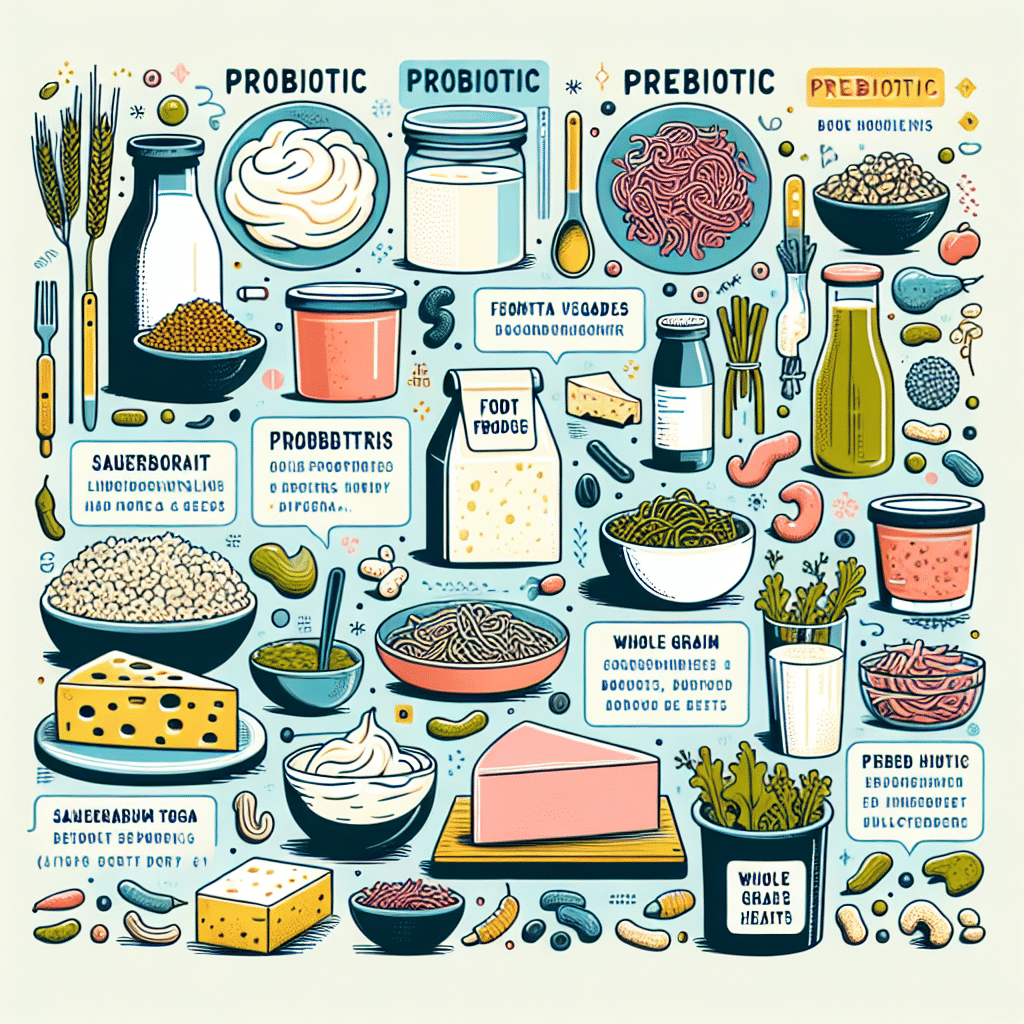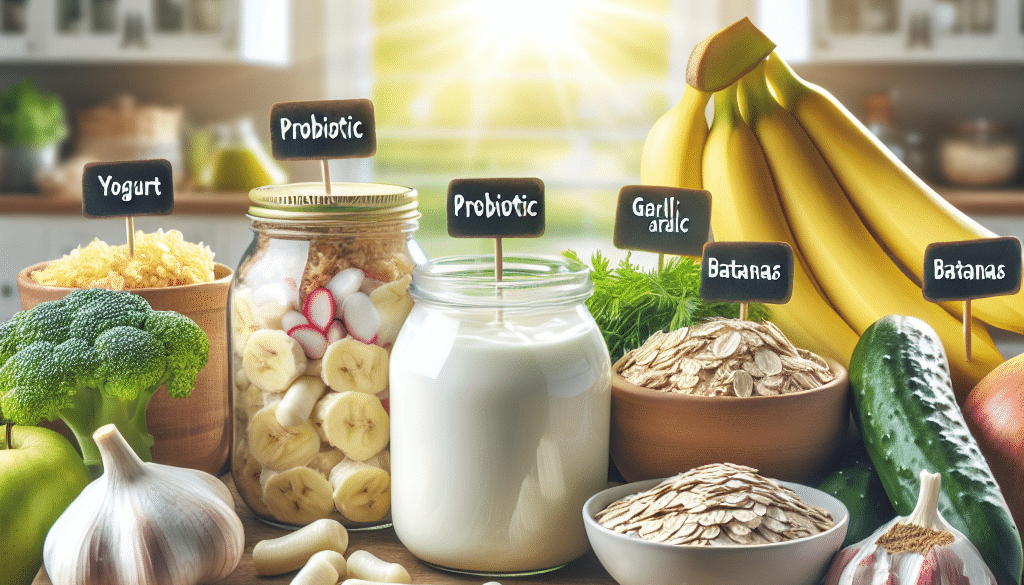Probiotic and Prebiotic Foods: Gut Health Made Easy
-
Table of Contents
- Probiotic and Prebiotic Foods: Optimizing Gut Health Naturally
- Understanding Probiotics and Prebiotics
- Probiotics: The Gut’s Friendly Bacteria
- Prebiotics: Fuel for Probiotic Bacteria
- Probiotic Foods for a Healthy Gut
- Prebiotic Foods to Enhance Gut Health
- Combining Probiotics and Prebiotics for Synergy
- Case Studies and Statistics: The Impact of Probiotics and Prebiotics
- Conclusion: Embracing Probiotic and Prebiotic Foods for Gut Health
- Enhance Your Diet with ETprotein’s Plant-Based Protein Products
Probiotic and Prebiotic Foods: Optimizing Gut Health Naturally

Gut health is a critical component of overall wellness, influencing everything from digestion to immune function and even mental health. The gut microbiome, a complex community of microorganisms living in our digestive tract, plays a pivotal role in maintaining this balance. Probiotics and prebiotics have emerged as key players in nurturing a healthy gut microbiome. This article delves into the world of these beneficial foods, offering insights into how they work and how you can easily incorporate them into your diet for optimal health.
Understanding Probiotics and Prebiotics
Before we explore the foods that support gut health, it’s essential to understand what probiotics and prebiotics are and how they function within the body.
Probiotics: The Gut’s Friendly Bacteria
Probiotics are live microorganisms that, when consumed in adequate amounts, confer a health benefit on the host. These beneficial bacteria and yeasts are similar to the naturally occurring microorganisms found in the human gut. They help maintain a healthy balance of gut flora, which is crucial for digesting food, absorbing nutrients, and preventing the overgrowth of harmful bacteria.
Prebiotics: Fuel for Probiotic Bacteria
Prebiotics, on the other hand, are non-digestible food components that selectively stimulate the growth or activity of beneficial microorganisms in the gut. They are essentially the food that feeds probiotics, helping them to thrive and multiply. Prebiotics are found in various forms of dietary fiber and other plant compounds.
Probiotic Foods for a Healthy Gut
Including probiotic-rich foods in your diet is an excellent way to support your gut microbiome. Here are some examples:
- Yogurt: One of the most well-known probiotic foods, yogurt is made by fermenting milk with live bacteria cultures.
- Kefir: A fermented milk drink similar to yogurt but with a thinner consistency and a broader range of bacteria.
- Sauerkraut: Fermented cabbage that contains a variety of probiotics and enzymes beneficial for digestion.
- Kimchi: A spicy Korean side dish made from fermented vegetables, rich in probiotics and vitamins.
- Miso: A Japanese seasoning produced by fermenting soybeans with salt and koji, a type of fungus.
- Tempeh: A fermented soy product that’s a great source of protein and probiotics.
- Pickles: Cucumbers that have been pickled in a solution of water and salt, allowing them to ferment and develop beneficial bacteria.
It’s important to note that not all fermented foods contain live probiotics, as some undergo processes like baking or canning that eliminate these beneficial organisms. Always check for “live and active cultures” on the label.
Prebiotic Foods to Enhance Gut Health
Just as important as probiotics, prebiotic foods help to nourish the good bacteria in your gut. Here are some prebiotic-rich foods to include in your diet:
- Chicory Root: A great source of inulin, a type of prebiotic fiber.
- Garlic: Contains high levels of inulin and fructooligosaccharides (FOS), which promote beneficial bacteria growth.
- Onions: Similar to garlic, onions are rich in inulin and FOS.
- Leeks: A member of the onion family with a milder flavor, leeks are another good source of inulin.
- Asparagus: Contains inulin and is also a good source of antioxidants.
- Bananas: While not as rich in inulin as other foods, bananas offer a modest amount of prebiotic fiber.
- Whole Grains: Such as barley and oats, which contain beta-glucan, a prebiotic fiber.
Consuming a variety of these foods can help ensure that you’re getting enough prebiotics to support your gut microbiome.
Combining Probiotics and Prebiotics for Synergy
For optimal gut health, it’s beneficial to consume both probiotic and prebiotic foods. This combination, sometimes referred to as “synbiotics,” can enhance the survival and activity of beneficial bacteria in the gut. An example of a synbiotic relationship is eating yogurt with banana slices, combining the probiotics in yogurt with the prebiotic fiber in bananas.
Case Studies and Statistics: The Impact of Probiotics and Prebiotics
Research has consistently shown the positive effects of probiotics and prebiotics on gut health. For instance, a study published in the “Journal of Clinical Gastroenterology” found that probiotics can help manage symptoms of irritable bowel syndrome (IBS). Another study in the “British Journal of Nutrition” highlighted that prebiotics could increase the absorption of minerals like calcium, which is essential for bone health.
Statistics also underscore the importance of gut health, with the global probiotics market projected to reach $77.09 billion by 2025, according to a report by Grand View Research. This growth is indicative of the increasing awareness and demand for gut health products.
Conclusion: Embracing Probiotic and Prebiotic Foods for Gut Health
Incorporating probiotic and prebiotic foods into your diet is a simple and natural way to support your gut health. By understanding the roles these foods play and making them a regular part of your meals, you can enjoy the numerous health benefits they offer. Remember to aim for variety and balance to nurture a diverse and robust gut microbiome.
Enhance Your Diet with ETprotein’s Plant-Based Protein Products
For those looking to complement their gut-healthy diet with high-quality protein, ETprotein offers a range of plant-based protein products. Their organic and non-GMO protein powders, such as rice protein, pea protein, and pumpkin seed protein, are excellent additions to smoothies, shakes, and other recipes. These protein sources can support your overall health and wellness goals while catering to your gut health needs.
About ETprotein:
ETprotein, a reputable plant protein vegan protein Chinese factory manufacturer and supplier, is renowned for producing, stocking, exporting, and delivering the highest quality organic bulk vegan protein and plant proteins. They include Organic rice protein, clear rice protein, pea protein, clear pea protein, watermelon seed protein, pumpkin seed protein, sunflower seed protein, mung bean protein, peanut protein etc. Their offerings, characterized by a neutral taste, non-GMO, allergen-free attributes, cater to a diverse range of industries. They serve nutraceutical, pharmaceutical, cosmeceutical, veterinary, as well as food and beverage finished product distributors, traders, and manufacturers across Europe, USA, Canada, Australia, Thailand, Japan, Korea, Brazil, and Chile, among others.
ETprotein specialization includes exporting and delivering tailor-made protein powder and finished nutritional supplements. Their extensive product range covers sectors like Food and Beverage, Sports Nutrition, Weight Management, Dietary Supplements, Health and Wellness Products, and Infant Formula, ensuring comprehensive solutions to meet all your protein needs.
As a trusted company by leading global food and beverage brands and Fortune 500 companies, ETprotein reinforces China’s reputation in the global arena. For more information or to sample their products, please contact them and email sales(at)ETprotein.com today.














